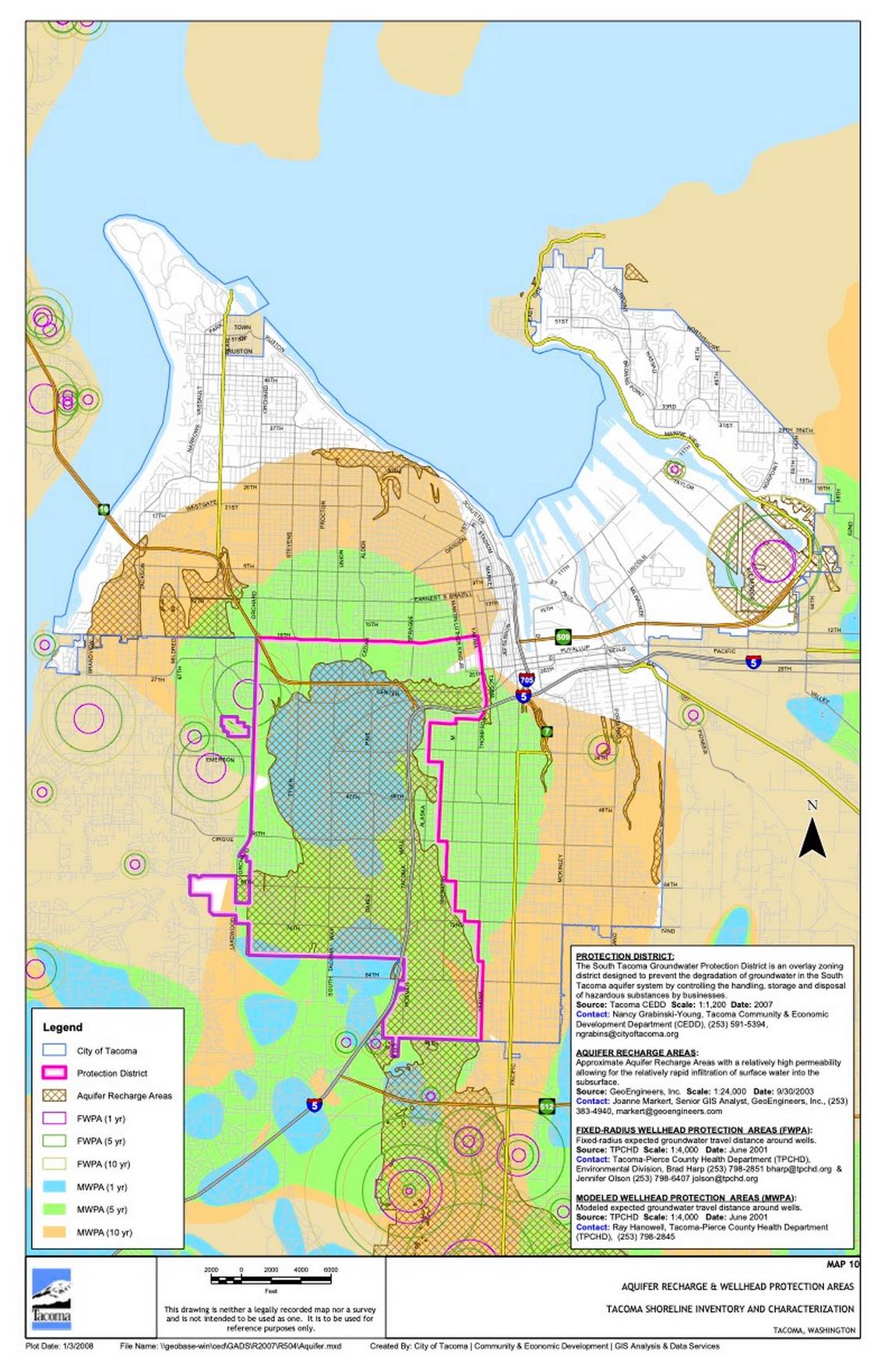Should new or expanded underground tanks be banned as city examines rules for this area?
Tacoma City Council is considering a moratorium to pause permitting for new underground storage tanks and new metal recycling and auto wrecking facilities in a groundwater protection district.
The moratorium would be in place for up to a year as the city staff considers long-term changes to the standards in the South Tacoma Groundwater Protection District.
The ordinance to establish a moratorium will go for its first reading at next Tuesday’s council meeting. If council approves the ordinance, it also would prohibit the expansion of existing underground storage tanks and metal recycling/auto wrecking facilities, except to conduct normal maintenance, repairs and replacements in the district.
The South Tacoma Groundwater Protection District was created to protect the South Tacoma aquifer’s drinking water from contamination. The district encompasses South 19th Street to South 80th Street from South Orchard Street to South Cushman Avenue, and includes sections that extend to South 96th Street and Yakima Avenue.

Water from the Green River supplies 95 percent of Tacoma’s water, according to Glen George, water supply manager at Tacoma Water. Groundwater is the utility’s secondary water source and supplies 40% to 50% of Tacoma’s water during peak demand. The South Tacoma aquifers can produce more than 33 million gallons of water a day.
In March 2021, the South Tacoma Neighborhood Council submitted an application to amend the city’s comprehensive plan, regulatory code and land use designation. The neighborhood council stated the South Tacoma aquifer is damaged and threatened and called for an update to the current zoning overlay of the district.
“Our neighborhood council and individual residents have brought concerns to the city for many years regarding the continued increase of heavily-polluting industry allowed in such close proximity to where we live, play, learn and work which has already resulted in health issues which could easily become a crisis,” the application stated.
Stephen Atkinson, the city’s principal planner, said the South Tacoma Groundwater Protection District has a “broad spectrum” of zoning and land uses, including single-family residential, multifamily residential, light and heavy industry in the manufacturing industrial center, Tacoma Mall regional growth center and mixed-use.
The neighborhood council proposed prohibiting:
metal recycling, metal shredding and auto crushing anywhere within the city limits but especially in the South Tacoma Groundwater Protection District and aquifer recharge areas,
above- or below-ground hazardous substance tanks or storage within the protection district and aquifer-recharge area,
new polluting industrial/manufacturing within the groundwater protection district and aquifer-recharge area.
Atkinson said metal recycling is considered a heavy industrial use, and underground storage tanks could be in the commercial districts. For example, gas stations use underground storage tanks, he said.
City Council approved a work plan in June that prompted city staff to review use and development standards associated with the South Tacoma Groundwater Protection District. At the same time, the council asked if a moratorium on industrial uses and hazardous substances in the district was warranted.
The work plan’s directive is to look at use categories that should be changed or modified and if new standards should be implemented.
The South Tacoma Groundwater Protection District Code would need to address the issues raised through the moratorium.
Atkinson said a moratorium is a mechanism used to pause development while the city reviews development standards in an area. A moratorium is meant to be temporary and can only be put into effect for six months or a year if there is a work plan in place. A moratorium could be extended but would need to have a public hearing and approval by council through an ordinance.
Earlier this month, the City Council held a public hearing regarding the proposed moratorium.
In a written comment, Heidi Stephens, South Tacoma Neighborhood Council at-large director, called for the council to pass the moratorium, but said it should be stronger to include no exceptions to new or expanded metal recycling/auto-crushing within the protection district.
“The first question of this council should not be how businesses are affected, but how the groundwater/aquifer is affected,” she wrote. “If the answer is not known, then the only action should be to stop.”
Chad Sutter, owner of Sutter Metals, wrote the South Tacoma metal recycling facility was in opposition to “any proposed moratorium within the South Tacoma Groundwater Protection District which would impair the substantial investment we have made in our Tacoma location and constrain its future responsible growth.” He added there is no basis for the city to target its operation with a moratorium.
If council were not to approve the moratorium, work to update the code would continue.
The city has enacted past moratoriums.
In 2017, council passed temporary land-use regulations for the Tideflats that would prohibit new fossil-fuel and other heavy industries from developing but did not limit businesses expanding. The city continues to consider regulatory changes.
Council also passed a six-month moratorium that banned the city from accepting and processing building and other permits for stores with a floor area more than 65,000 square feet in 2011. Tacoma was ordered to pay $2.75 million after a Walmart developer sued, claiming the city wrongfully applied a moratorium to permit applications for the store.
Atkinson said the staff tries to be cautious with what it recommends.
“We want to make sure for community expectations, for council, for the decision makers, that’s a really clear demarcation that you can’t use the moratorium to basically try to stop a permit,” he said.
